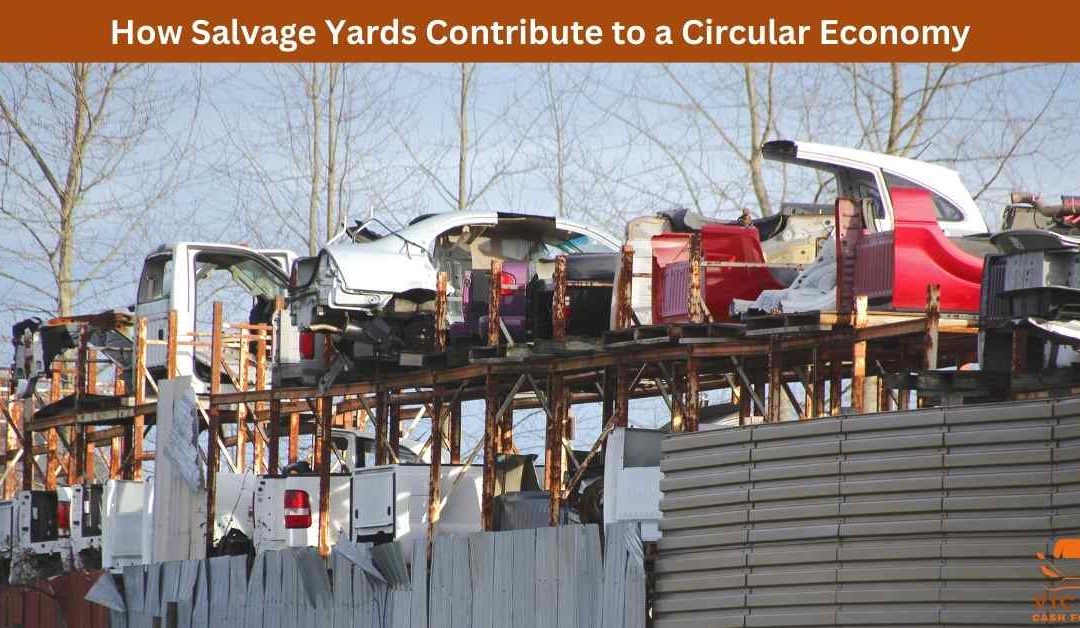In today’s world, where sustainability and environmental conservation are becoming increasingly important, salvage yards play a crucial role in promoting a circular economy. By repurposing and recycling materials from old and unwanted vehicles, salvage yards help reduce waste, conserve resources, and support eco-friendly practices. In this article, we’ll explore how salvage yards contribute to a circular economy and why they are vital to our sustainable future.
What is a Circular Economy?
A circular economy is a system that focuses on minimizing waste and making the most of resources. Unlike the traditional linear economy—where products are made, used, and then discarded—a circular economy aims to keep resources in use for as long as possible. This is achieved through recycling, reusing, and refurbishing materials, thus reducing the need for new raw materials and minimizing environmental impact.
The Role of Salvage Yards in a Circular Economy
Salvage yards, often known as auto wreckers or car recyclers, are at the heart of the circular economy in the automotive industry. Here’s how they contribute:
1. Vehicle Recycling
Salvage yards dismantle old, damaged, and unwanted vehicles, salvaging parts that are still in good condition. These parts are then cleaned, tested, and sold as used auto parts, giving them a new lease on life. By recycling these parts, salvage yards help reduce the demand for new parts, conserving the raw materials and energy required to manufacture them.
2. Metal Recycling
One of the most significant contributions of salvage yards is metal recycling. Vehicles contain a large amount of metal, which can be melted down and reused in the production of new products. Recycling metal from vehicles reduces the need for mining new ores, which is a resource-intensive process that causes significant environmental damage. By recycling metal, salvage yards contribute to conserving natural resources and reducing greenhouse gas emissions.
3. Reducing Landfill Waste
When vehicles are disposed of in landfills, they take up valuable space and can leak harmful chemicals into the environment. Salvage yards help prevent this by breaking down vehicles and ensuring that as many parts as possible are recycled or repurposed. This significantly reduces the amount of waste that ends up in landfills, contributing to a cleaner environment.
4. Supporting Local Economies
Salvage yards support local economies by providing affordable used auto parts to consumers. This not only helps people save money but also encourages the reuse of parts rather than purchasing new ones. Additionally, salvage yards create jobs in the community, from dismantling vehicles to managing sales and recycling processes.
5. Environmentally Friendly Practices
Salvage yards are increasingly adopting environmentally friendly practices, such as safely disposing of hazardous materials like engine oil, coolant, and batteries. By doing so, they prevent these substances from contaminating the soil and water, contributing to a healthier ecosystem.
The Future of Salvage Yards in a Circular Economy
As the importance of sustainability continues to grow, the role of salvage yards in the circular economy is likely to become even more significant. With advances in technology, salvage yards will be able to recycle and repurpose even more materials, further reducing waste and conserving resources.
Governments and industries are also recognizing the value of salvage yards in promoting a circular economy. Policies and incentives are being introduced to encourage the recycling of vehicles and the use of recycled materials in manufacturing. This will help ensure that salvage yards remain a vital part of the circular economy for years to come.
Conclusion
Salvage yards are essential contributors to a circular economy, helping to reduce waste, conserve resources, and support sustainable practices. By recycling and repurposing materials from old vehicles, they play a key role in minimizing environmental impact and promoting a more sustainable future. For consumers, choosing to work with a salvage yard not only benefits the environment but also supports local economies and provides access to affordable, high-quality used auto parts.
In Melbourne, Victoria, our cash-for-cars company is committed to supporting a circular economy by ensuring that every vehicle we purchase is processed responsibly. Whether you’re selling an old car or looking for quality used parts, we’re here to help you make a positive impact on the environment.
If you are in Dandenong North, Victoria 3175, and looking for cash for cars Melbourne service, this is the best way to visit us.
VIC Top Cash For Cars
2 Rochford Pl, Narre Warren South VIC 3805
(03) 7035 7828


Recent Comments